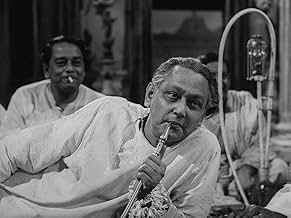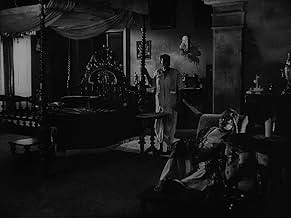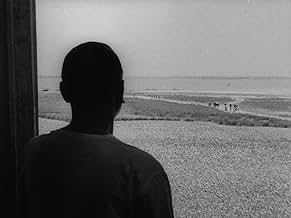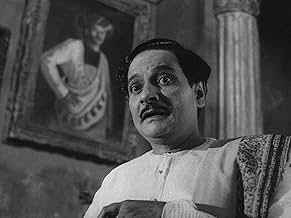Bishambar Roy é um rico proprietário indiano que vive com sua esposa e seu filho, gastando a maior parte da renda de sua família em festivais de música. Ele perde toda a sua riqueza ao compe... Ler tudoBishambar Roy é um rico proprietário indiano que vive com sua esposa e seu filho, gastando a maior parte da renda de sua família em festivais de música. Ele perde toda a sua riqueza ao competir com seu vizinho.Bishambar Roy é um rico proprietário indiano que vive com sua esposa e seu filho, gastando a maior parte da renda de sua família em festivais de música. Ele perde toda a sua riqueza ao competir com seu vizinho.
- Direção
- Roteiristas
- Artistas
- Prêmios
- 3 vitórias e 2 indicações no total
- Mahamaya, Roy's wife
- (as Padma Devi)
- Singer
- (as Begum Akhtar)
- Ustad Ujir Khan
- (as Ostad Wahed Khan)
- Direção
- Roteiristas
- Elenco e equipe completos
- Produção, bilheteria e muito mais no IMDbPro
Avaliações em destaque
"The Music Room", as it is known in English, is as much about the power of cinema as it is about that of music. It is as much about life as it is about death, both elliptically consummate by reason of each other: art as a life of inspiration, inspiration as regained strength. Art as addiction, addiction as loneliness, loneliness as death.
The ending is one of the most filmically mesmerizing moments I know of. Light and shadow, derangement and perspicuity, again life and death. And as for the Blu-ray (Region A) released by the Criterion Collection in 2011, it's phenomenal to the hilt, a cultural act in itself, in my books among their most enduring and best releases so far (perhaps only the complete Jean Vigo compares).
Written, produced & directed by Ray, the film concerns a feudal landlord's passion for music & quest for social respect in the rapidly changing India and his refusal to change with the times that leads to his undoing. Through his dwindling fortunes & decadent lifestyle, Ray attempts to illustrate the contrast between old & new India and the fate that awaits those who cling on to their obsolete past & are unwilling to accept or acknowledge the modern society.
Our protagonist isn't shown in a negative light however. Instead, the film observes his all-consuming obsession with music, pride in his social prestige & envy for his next-door neighbour's increasing fortunes, and how they contribute to his downfall. Chabbi Biswas' performance is nearly flawless, and he brings the ill-fated landlord to life with all his flaws & virtues in tact. Also adding to the experience are opulent set pieces, beautiful camerawork, and neat use of classical Indian music & dance.
Overall, Jalsaghar presents the Bengali filmmaker tightening his grasp around his craft, and is one of his most impressive directorial efforts. Much worthy of broader viewership and having aged like a fine wine, the film's slow pace & overlong finale may not appease everyone but its elegant & authentic portrait of India undergoing an essential transformation after independence and the tragedy of a prideful man who's destroyed by his own hubris makes it an enduring classic of Indian cinema. Thoroughly recommended.
Você sabia?
- CuriosidadesThe film is included on Roger Ebert's "Great Movies" list.
- Erros de gravaçãoAfter talking to his wife about the cost of the music party, a close-up shows the landlord falling asleep with his hand bent down at the wrist. After the cut to medium, his hand lies straight up in his neck.
- Citações
Huzur Biswambhar Roy: [laughing drunkenly, deriding the moneylender's son, Ganguly] He failed. He failed!
Huzur Biswambhar Roy: [now talking to his servant Ananta, who is refilling his glass with liquor] He couldn't do it. He couldn't do it! That moneylender's son! He wanted to be king of the mountain. What arrogance, huh? What arrogance! A dwarf reaching for the moon! He couldn't do it. You know why he failed?
Huzur Biswambhar Roy: [speaking directly to Ananta] Blood! The blood in my veins! You know whose blood flows in my veins? You want to see? Come...
Huzur Biswambhar Roy: [proceeding to point out portraits on the wall of his elders] My father... my grandfather... my great grandfather... my great-great grandfather.
- ConexõesFeatured in Celluloid Man (2012)
Principais escolhas
Detalhes
- Data de lançamento
- País de origem
- Central de atendimento oficial
- Idiomas
- Também conhecido como
- The Music Room
- Locações de filme
- Nimtita Rajbari, Nimtita, West Bengal, Índia(The House)
- Empresa de produção
- Consulte mais créditos da empresa na IMDbPro
Bilheteria
- Faturamento bruto mundial
- US$ 3.247
- Tempo de duração
- 1 h 40 min(100 min)
- Cor
- Mixagem de som
- Proporção
- 1.37 : 1
























